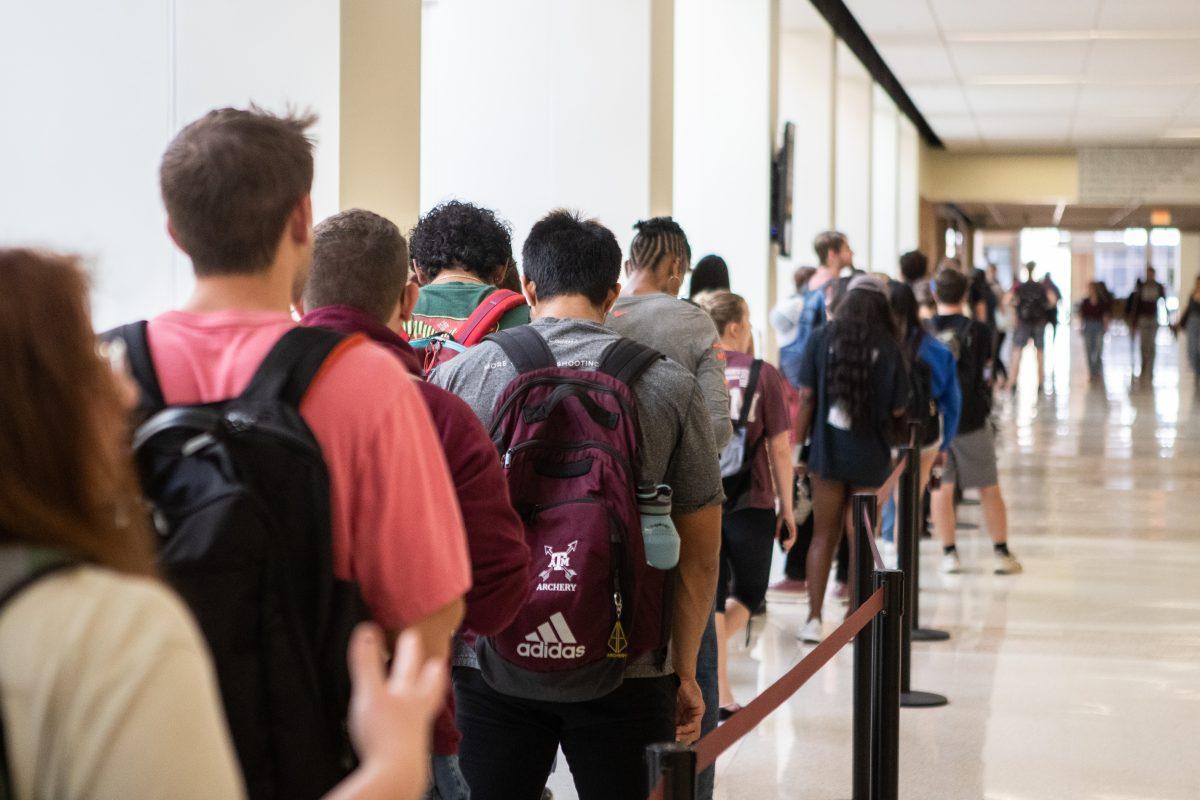Election Day on Tuesday, Nov. 7 approaches, and aside from voting in leaders, the ballot will feature 14 statewide constitutional amendments for Texans to decide. Political Science professor Dwight Roblyer, Ph.D, along with students, provide input on this year’s election.
Political science professor Dwight Roblyer, Ph.D., provided a brief overview of each constitutional amendment up for election. They are as follows:
Proposition Number 1
Proposition 1 would make it a state constitutional right for a person to use their property for agricultural purposes.
Many agricultural associations and organizations support it. Detractors are fewer in number and mainly focus on its broad, unspecific wording and its possible effects when local governments may need to restrict these types of activities within their jurisdictions.
Proposition Number 2
Proposition 2 would allow the state legislature to pass a law exempting childcare facilities from paying some or all of their property tax.
This was sponsored by legislators concerned about the critical shortage of childcare services in the state. Opponents likely consider it to be an unnecessary loss of tax revenue.
Proposition Number 3
Proposition 3 would prohibit the state legislature from imposing a tax on the wealth or net worth of a person or family — such as a sum total of the values of savings, investments, property and the like.
A prohibition against an income tax was already added to the state constitution four years ago. No state currently has a tax on wealth or net worth of persons or families.
Those who are against additional taxes generally support the proposition. Those who oppose it are concerned that important parts of the state government, such as the child welfare and public education systems, are critically underfunded and want to keep all possible means of additional revenue generation available.
Proposition Number 4
Proposition 4 would raise the property tax homestead exemption from $40,000 to $100,000.
This would mean that every property that serves as the primary residence, or “homestead,” of one or more people would not be taxed on the first $100,000 of its value.
Proponents want to see the very high property taxes in Texas continue to be cut back. Texas does have one of the highest property tax rates in the U.S. However, Texas also does not have a state income tax, so that requires additional revenue generation from the types of taxes it uses.
Additionally, property taxes benefit only local governments, not the state, and the bulk goes to local school districts. Those who oppose the proposition are primarily concerned about another cut to what they see as already inadequate school funding.
Proposition Number 5
Proposition 5 would rename an existing special state investment fund that provides a form of endowment for major universities in Texas.
The proposition also establishes a steady flow of revenues into the fund to ensure that it continues to grow over time. Because Texas A&M and the University of Texas already have access to a different fund, they would not benefit from this new one.
There is widespread support and no noticeable opposition to this proposition.
Proposition Number 6
Proposition 6 establishes a new state-level water fund to help improve water supplies by replacing pipes and other infrastructure, as well as adding new systems as the state grows.
There is widespread support and no noticeable opposition to this proposition.
Proposition Number 7
Proposition 7 establishes a new state-level energy fund to help improve electrical generation and distribution.
Money would be loaned out for approved projects across the state. Many traditional energy companies and organizations support the proposition. Opposing it is a coalition of advocates for more emphasis on growing clean energy capabilities.
Proposition Number 8
Proposition 8 establishes a new state-level account to fund the creation of a state-wide broadband infrastructure that would better support the availability of high-speed internet and communications services to all Texans, even those far from urban centers.
Mobile carriers and cable services would benefit greatly, so are big supporters. Opposition is limited and likely based on governmental interference in the open market.
Proposition Number 9
Proposition 9 would give retired teachers in Texas their first increase in their monthly retirement checks in nearly 20 years.
This is only a one-time payment and, at most, would only total a few thousand dollars. Teachers who retired in the early 2000s have lived on the same amount every month without any adjustment for inflation, which has raised prices by over 60% during the same period.
There is widespread support and no noticeable opposition to this proposition.
Proposition Number 10
Proposition 10 would allow the state legislature to pass a law exempting certain types of property belonging to medical and biomedical equipment manufacturers from taxation.
Proponents largely include supporters of the biotech industry. There is no noticeable opposition.
Proposition Number 11
Proposition 11 is particular to El Paso County and would authorize local governments there to borrow money to construct parks and recreational areas, then levy property taxes to repay the loans. This has already been done in multiple other counties in the state.
Proposition Number 12
Proposition 12 is particular to Galveston County and would permit the county to abolish the position of county treasurer. Other counties have already done the same. In lieu of the treasurer, the county can either designate another official or outsource a contractor to complete the duties.
Proposition Number 13
Proposition 13 would raise the mandatory retirement age for judges and justices in Texas from 75 to 79.
This is seen by supporters as consistent with the fact that many people are continuing to work longer as our useful life span has increased. There is no noticeable opposition.
Proposition Number 14
Proposition 14 would set up a Centennial Parks Conservation Fund to create and improve state parks.
The money could not be used for employee salaries or benefits or for administrative costs. The proposition is supported by environmental groups and those concerned about our state parks. There is no noticeable opposition.
Deciding what propositions to vote for
Roblyer said the most important amendments depend on voters and who they know.
“If you are a frequent user of state parks, Proposition [Number] 14 matters,” Roblyer said. “If you are a friend or family member of a retired teacher, then Proposition [Number] 9. If you, a loved one, or a friend live in rural Texas and are without broadband service, Proposition [Number] 8.”
People should care about this election because representation becomes uneven, Roblyer said.
“Only about 3-6% of Texans of voting age usually take the time and effort to vote on propositions like these,” Roblyer said. “This means that those that do not vote are not evenly representing all of Texans. Instead, they are quite unrepresentative. Your voice is missing when you don’t vote.”
Roblyer said people should also care about voting because constitutional amendments have weak opposition and are resistant to change.
“Most all constitutional propositions pass because there is rarely a strongly organized and well-funded opposition,” Roblyer said. “When something becomes part of the state constitution, it is much more difficult to change than if it were just a regular law.”
Electrical engineering sophomore Nayab Warach said Texas’ constitutional amendments affect voters’ daily lives.
“College students should care about this election because a lot of changes to Texas’ constitution are being voted on and affect you in some way,” Warach said. “Things like taxes, research funding and local government are things that really affect your daily life.”
Warach said Propositions Number 5 and 7 are important to him in this election.
“Currently, A&M is one of the only recognized research universities, and Texas Tech University, Texas State University and the University of North Texas could use more funding,” Warach said. “Proposition [Number] 5 allows for better research for all of us. Proposition 7 invests more into power plants. They are not renewable, but something is better than nothing.”
Voters should research carefully what these propositions mean before voting, Warach said.
“Make sure you research all the propositions because they are very technical and very wordy,” Warach said. “Ask yourself. Does that make sense to you? Is that what you want as a voter?”
History and political science sophomore Zach Spanhak said Proposition Number 1 is one of the most important propositions.
“I think all the propositions are pretty important, but I think the one that is going to gain the most traction in the news and the one that people are going to want to take a good look at is Proposition [Number] 1,” Spanhak said. “Proposition [Number] 1 is about the right to farm, and there are also a lot of others that are environmentally focused that are worth looking into.”
Spanhak said people should vote to get their voice out there.
“There are a lot of good reasons to vote right now,” Spanhak said. “I think it’s important for everyone to get their voice heard as it’s part of upholding democracy, which is casting our votes and making government work as it should. Thereby, making it work for us.”
The Memorial Student Center, or MSC, voting location at A&M, which was taken away last election cycle, will also be affected by this election, Spanhak said.
“Students especially should vote because there have been a lot of groups on campus that have worked really hard to get the MSC back as an early voting location,” Spanhak said. “It got taken away last election cycle, and there’s always a possibility that it can get taken away in the future. This was one of my main motivations for voting, which was to show that this voting location is really valuable for students.”
Spanhak said students should register to vote in College Station.
“Go out and vote,” Spanhak said. “If you’re not registered to vote in College Station now, register to vote in College Station for the 2024 primaries.”





















